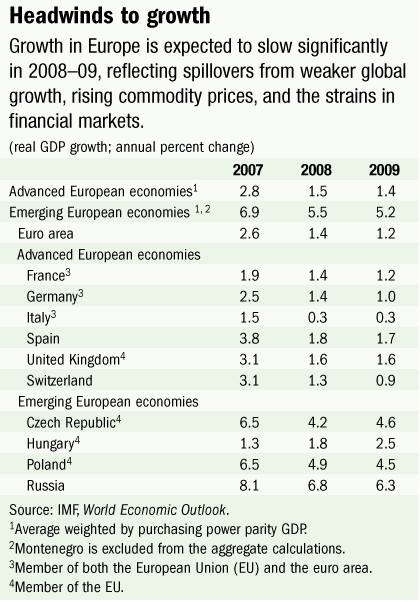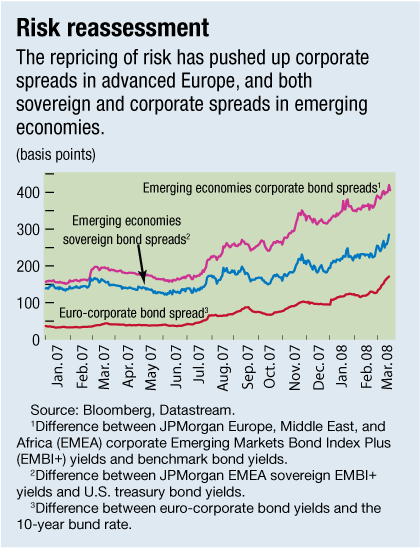
Typical street scene in Santa Ana, El Salvador. (Photo: iStock)
IMF Survey: Resilient Europe Faces Further Test
April 21, 2008
- Global shocks have dampened outlook for European economy
- Inflation complicates policy response to slowing economy
- Europe's emerging economies need to address imbalances
Financial market strains, spillovers from the U.S. slowdown, and the global reassessment of risks will adversely affect Europe in 2008, the IMF's latest Regional Economic Outlook (REO) says.

French vegetable market: Policymakers in Europe's advanced economies need to anchor inflation, Regional Economic Outlook says. (photo: Newscom)
REGIONAL ECONOMIC OUTLOOK
The euro's appreciation and the increase in commodity prices are adding to these troubles.
In advanced Europe, output growth is expected to slow from 2.8 percent in 2007 to 1.5 percent in 2008. In emerging Europe, growth should decelerate from 6.9 percent in 2007 to 5.5 percent (see table). Uncertainties surrounding the outlook remain unusually high, the REO, published on April 21, emphasizes.
"There is no escaping the fact that we have a global shock to the financial system, and it is bound to affect Europe as well," said Michael Deppler, Director of the IMF's European Department. "The slowdown in the United States will pervade the world economy, and the IMF is steadily bringing down its forecasts for Europe. Some people have expressed great pessimism about Europe's prospects. I would not go that far.
"In my view, Europe will experience a couple of years of slow growth. Unemployment, which until now had been declining steadily, will probably start to rise again. That being said, I remain reasonably sanguine that Europe's economy will be more resilient than that of the United States," he added in an interview with IMF Survey magazine.
Resilient but no decoupling
So far, Europe's financial systems have weathered the financial turbulence relatively well: the soundness of the major systemic players has been preserved, and spillovers to emerging Europe have been limited.

But the test is not over. While several European banks have disclosed large losses, the aggregate number so far (approximately $80 billion as of March 2008) falls short of the total loss estimates (approximately $123 billion). Also, the widening of the crisis beyond the subprime mortgage market may hit European financial institutions further, and, through their impact on parent banks in advanced economies, spread into emerging Europe.
Moreover, in advanced Europe, counterparty confidence remains disrupted in the interbank markets, and liquidity considerably impaired, despite central banks' heavy intervention. Everywhere, the global repricing of risk has pushed up spreads in different asset classes (see chart). Financing costs have increased, and credit standards have been tightened.
Furthermore, in line with historical evidence, any slowdown in the U.S. will likely spread into Europe. Typically, a 1 percent reduction in U.S. growth leads to a ½ percentage point decline in growth in advanced European economies with a six month lag, and about a ¾ percentage point shortfall for emerging economies, taking into account the joint effect.
Testing times for policymakers
The immediate task for policymakers in advanced economies is to restore confidence in the financial system and minimize the impact of the turmoil on the real economy. At the same time, they need to anchor inflation and safeguard long-term fiscal sustainability.

Central banks should continue to provide liquidity, and strike the right balance between supporting the real economy and preventing second-round effects from the recent rise in inflation. If, as anticipated, inflation expectations remain anchored and indicators confirm the projected slowdown, room for monetary policy easing will increasingly emerge.
For countries with fiscal room, automatic stabilizers should be allowed to cushion the downturn. In the event of a more severe contraction in growth, a timely, temporary, and well-targeted fiscal stimulus would be warranted, provided that fiscal sustainability were not jeopardized.
Emerging economies not immune
In emerging Europe, the convergence process is set to continue, but at a slower pace. The baseline outlook is for growth rates decelerating, but, for most of the region, remaining close to potential growth. Meanwhile, headline inflation has picked up strongly on the back of food and commodity price increases.
However, due to emerging Europe's trade and financial openness, downside risks to growth are substantial, especially in countries with large external imbalances. In particular, the heavy dependence on foreign capital leaves the region exposed to the risk of capital flows reversal.
In economies still experiencing overheating, tight monetary and fiscal policies are needed to manage demand pressure, reduce imbalances, and prevent second-round effects from rising inflation. In countries with large imbalances and where the economy is already cooling down, the top priority is to minimize the risk of a hard landing through structural reforms and a strengthening of the financial sector.


